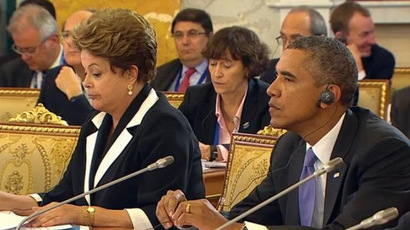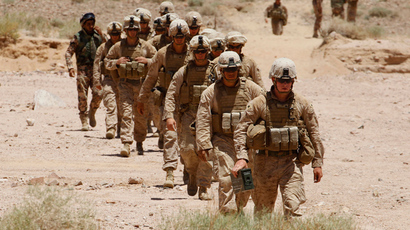Syria, NSA scandal push G20 summit agenda
Despite pleasant views of St. Petersburg and a large list of economic challenges on world leaders’ agendas, political tension was apparent at the start of the G20 summit as the US faced questions regarding its stance on Syria and the NSA spying program.
At the Konstantinovsky Palace – where the first day of the G20 summit kicked off – the world’s largest economic powers braced for political battles, RT’s Aleksey Yaroshevsky reported from Strelnya.
The situation in Syria took center stage in summit discussions,
despite Russian President Vladimir Putin’s opening call to “not
mix up and bundle” economic and political issues. The
two-and-a-half year conflict escalated after a chemical weapons
attack took place outside of Damascus on August 21. The US
believes it has evidence connecting the Syrian government to the
attack. All eyes are currently on Congress as it decides whether
to support a US strike on Syria.

Although a meeting on Syria was not officially scheduled to take place at the summit, Putin suggested leaders spoke about the topic at dinner.
Putin’s words came soon after his much anticipated handshake with US President Barack Obama. Recently strained Russian-American relations have become another focus of the media’s attention.
The two leaders are not scheduled to meet privately in St. Petersburg. However, neither Washington nor Moscow have ruled out the possibility of discussing pressing bilateral issues on the sidelines of the summit.
Syria on everyone’s mind
At the G20 dinner, UN Secretary General Ban Ki-moon addressed the situation in Syria, urging that any response to alleged chemical weapons use in Syria first go through the UN.
"I sincerely hope that all the leaders of the five permanent Security Council members and some non-permanent members who are now here fully meet their obligations to the Syrian people," Ban said.
The Secretary General earlier stated that the UN values the cooperation and assistance of the Syrian government regarding the investigation in Syria.
The US has accused Russia of holding the UN Security Council (UNSC) “hostage” over Syria by blocking the White House’s push for support in the UNSC.
"Even in the wake of the flagrant shattering of the international norm against chemical weapons use, Russia continues to hold the council hostage and shirk its international responsibilities," US ambassador to the United Nations Samantha Power told reporters.
Putin’s spokesman, Dmitry Peskov, stated Russia’s position on Syria to reporters. He called for Russia’s partners, including the US, to take part in an “objective assessment of the situation,” dismissing the idea that Russia blocks the work of the UN Security Council on the Syrian conflict.
Only after UN investigators have their say on the alleged chemical attack in Syria would it be possible to say who perpetrated the attack, Peskov stressed. He added that Russia “cannot accept the proof that, in our view, is not a proof at all, that is far from being convincing.”

Amid speculations that President Obama has arrived in St. Petersburg to gain support on launching a “punitive” strike against Syrian President Bashar Assad, Italian Premier Enrico Letta stated that the G20 summit is the “last opportunity” for finding a political solution to the Syrian crisis, adding that concerns over the situation there has hit “maximum” levels.
This could well sum up the notions coming from the briefings, bilateral meetings, and joint talks of the BRICS group during the summit’s first day.
Obama started off the event by meeting with French President Francois Hollande, the only remaining European supporter of a strike on Syria. Meanwhile, Putin met with Chinese President Xi Jinping, who has consistently called for a peaceful solution to the conflict.
Chinese Foreign Ministry spokesperson Qin Gang told RT at the summit that it is “vitally important” that any move on Syria be based on the UN investigation, stressing that China is “against the use of chemical weapons by any countries or organizations.”
“China and Russia are both appealing to the countries concerned to be serious about the possible consequences of the use of military means without the mandate of the UN Security Council,” Qin added.
Leaders of the BRICS group, which includes the economies of Russia, China, India, Brazil, and South Africa, then jointly expressed their concerns that a military strike against Syria could have “an extremely negative effect” on the global economy.
They also stressed that the only legitimate body that can approve any kind of action on Syria is the UN Security Council, and that facts should not be manipulated to justify an attack.
Ahead of a meeting with Japanese Prime Minister Shinzo Abe, Obama said that “joint recognition that the use of chemical weapons in Syria is not only a tragedy but also a violation of international law that must be addressed.”

Will Washington go it alone?
However, when it came to statements by America’s key EU and NATO allies, it became increasingly apparent that “the US might have to go it alone” with its forceful action against Assad, RT’s Anissa Naouai reported.
“The European Union is certain that the efforts should be aimed at a political settlement,” the President of the European Commission, Jose Manuel Barroso, told reporters at the G20 briefing, appealing to the whole international community.
German Chancellor Angela Merkel has defined her country’s position on Syria, saying that she does not believe military intervention is the answer, and that Germany will support a political solution.
French President Hollande, whose country was divided over supporting a strike on Syria, said that he expects some “political progress,” calling for a unified EU position on the issue. It was not immediately clear if Hollande had a change of heart in his readiness to join the US in military intervention.
In addition, Pope Francis called on world leaders attending the G20 summit in Russia to seek peace in Syria through diplomatic means, laying aside the “futile pursuit” of a military solution.
“To the leaders present, to each and every one, I make a heartfelt appeal for them to help find ways to overcome the conflicting positions and to lay aside the futile pursuit of a military solution,” Francis wrote.
NSA in the spotlight
Another cloud over the G20 summit is the NSA scandal, with many countries seeking an explanation from the US after spying tactics were revealed by whistleblower Edward Snowden.
The relationship between US and Russia has been tense since Snowden was granted asylum in Russia in August. In retaliation, Obama cancelled plans to meet with Putin in Moscow ahead of the G20 summit.
One of the most recent revelations said that the NSA’s spying program allegedly targeted the communications of the presidents of Mexico and Brazil.
Brazilian President Dilma Rousseff met with Barack Obama on Thursday to discuss revelations that the US had spied on her private communications, Reuters quoted a White House official as saying.
Rousseff may cancel her visit to the White House in October unless the US extends a public apology for the alleged spying, according to senior Brazilian official.
Brazil gave the US until Friday to issue a written explanation of the NSA spying reports.
The US will try to resolve the situation through “diplomatic and intelligence channels,” deputy US national security adviser Ben Rhodes said.
"We understand how important this is to the Brazilians. We understand their strength of feeling on the issue," he added. "What we're focused on is making sure the Brazilians understand exactly what the nature of our intelligence effort is."
Mexican President Enrique Pena Nieto told RT that America would have to cough up some extravagance to try and mend relations that have been damaged by the NSA spying revelations.
“The Mexican government called on the US to conduct a thorough investigation into who is responsible for the spying if it really happened,” Nieto said. He asked Obama about “actions his administration would take in order to make this investigation happen and clarify the issues that have been surfaced recently…certain measures have to be taken, there must be consequences.”














